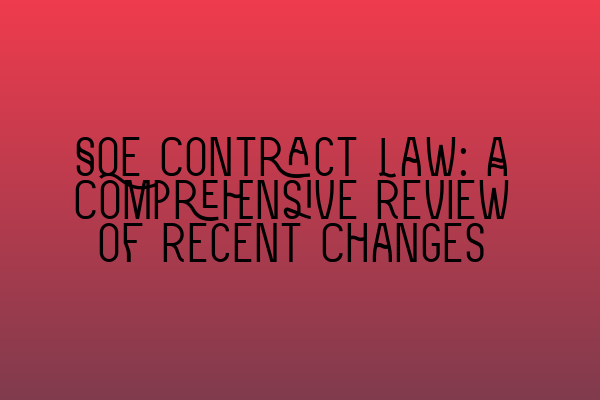SQE Contract Law: A Comprehensive Review of Recent Changes
Welcome to our comprehensive review of recent changes in SQE Contract Law. The Solicitors Qualifying Examination (SQE) has brought about significant changes to the legal profession and the way aspiring solicitors qualify. In this article, we will explore the key updates in SQE Contract Law and discuss their implications for legal professionals and law students alike.
The Shift from Traditional Qualifications
The SQE Contract Law has replaced the traditional qualification pathway for solicitors in England and Wales. This new qualification, introduced by the Solicitors Regulation Authority (SRA), aims to provide a more accessible and standardized route to becoming a qualified solicitor. It offers flexibility in terms of education and work experience, allowing candidates to demonstrate their competence through a series of assessments.
With its introduction in November 2021, the SQE Contract Law has brought significant changes to the legal education landscape. It has replaced the previous route of obtaining a Qualifying Law Degree (QLD) or Graduate Diploma in Law (GDL), followed by the Legal Practice Course (LPC), and a two-year training contract.
Key Components of SQE Contract Law
The SQE Contract Law consists of two stages: SQE1 and SQE2. Let’s take a closer look at each of these stages.
SQE1: Assessing Legal Knowledge
SQE1 focuses on assessing foundational legal knowledge and understanding. It consists of two parts:
- Functioning Legal Knowledge (FLK) Examination: This examination tests candidates on areas such as Constitutional and Administrative Law, Criminal Law, and Tort Law.
- Practical Legal Skills (PLS) Examination: This examination assesses candidates’ practical legal skills, including client interviewing, legal research, and legal writing.
These assessments are designed to test candidates’ understanding of core legal principles and their ability to apply legal knowledge in real-world scenarios.
To prepare for the FLK Examination, candidates should focus on key topics such as contract law, tort law, criminal law, and constitutional law. In-depth understanding of these subjects, along with regular practice and revision, will greatly enhance candidates’ chances of success.
On the other hand, the PLS Examination requires candidates to demonstrate their practical legal skills. This can be developed through mock client interviews, legal research exercises, and legal writing exercises. Practice in these areas will help candidates refine their skills and perform well in the assessment.
For further insights into the impact of frustration on contractual obligations, you can check out our article Exploring the Impact of Frustration on Contractual Obligations: Legal Insights.
SQE2: Assessing Practical Legal Skills
SQE2 focuses on assessing candidates’ practical legal skills in more complex scenarios. It consists of two assessments:
- Client Interviewing and Advocacy: Candidates are required to conduct a simulated client interview and demonstrate their advocacy skills during this assessment.
- Legal Research and Legal Writing: This assessment evaluates candidates’ ability to conduct legal research, analyze the findings, and produce a written document.
These assessments are designed to test candidates’ ability to apply their legal knowledge and skills in a practical setting. It requires strong analytical thinking, effective communication, and professional conduct.
Interpreting contractual clauses is crucial in contract law. To gain a deeper understanding of this topic, make sure to read our article on Interpreting Contractual Clauses: Unlocking the Hidden Meanings.
Implications and Benefits of SQE Contract Law
The introduction of SQE Contract Law brings several implications and benefits for aspiring solicitors and legal professionals. Let’s explore some of these below:
- Standardization: The SQE offers a standardized assessment process, ensuring that all candidates are evaluated based on the same criteria. This promotes fairness and consistency in the qualification process.
- Flexibility: Candidates have the flexibility to choose their educational and work experience pathway, allowing for a more personalized approach to qualifying as a solicitor.
- Practical Focus: The SQE Contract Law emphasizes the practical application of legal knowledge and skills, ensuring that candidates are prepared for the demands of legal practice.
- Cost-effective: The SQE eliminates the need for candidates to pursue costly traditional qualifications like the QLD, GDL, and LPC.
For entrepreneurs and business professionals, understanding the legal aspects of business contracts is essential. To gain key insights into this topic, we recommend reading our article on Legal Aspects of Business Contracts: Key Considerations for Entrepreneurs.
Comparing the SQE Contract Law with traditional qualifications can help aspiring solicitors make informed decisions about their career paths. To learn more, check out our article on SQE Contract Law vs. Traditional Qualifications: A Comparative Analysis.
Conclusion
The SQE Contract Law introduces significant changes to the qualification pathway for solicitors. Its focus on practical skills and standardized assessments brings new opportunities and challenges. Aspiring solicitors should familiarize themselves with the key components of the SQE, prepare diligently, and seek appropriate resources to ensure success in their journey towards becoming qualified solicitors.
To further enhance your understanding of agreements in contract law and its various types, we recommend reading our article on Agreements in Contract Law: Understanding Its Various Types.
Stay updated with the latest developments and keep honing your legal knowledge and skills to thrive in the ever-evolving legal profession!
